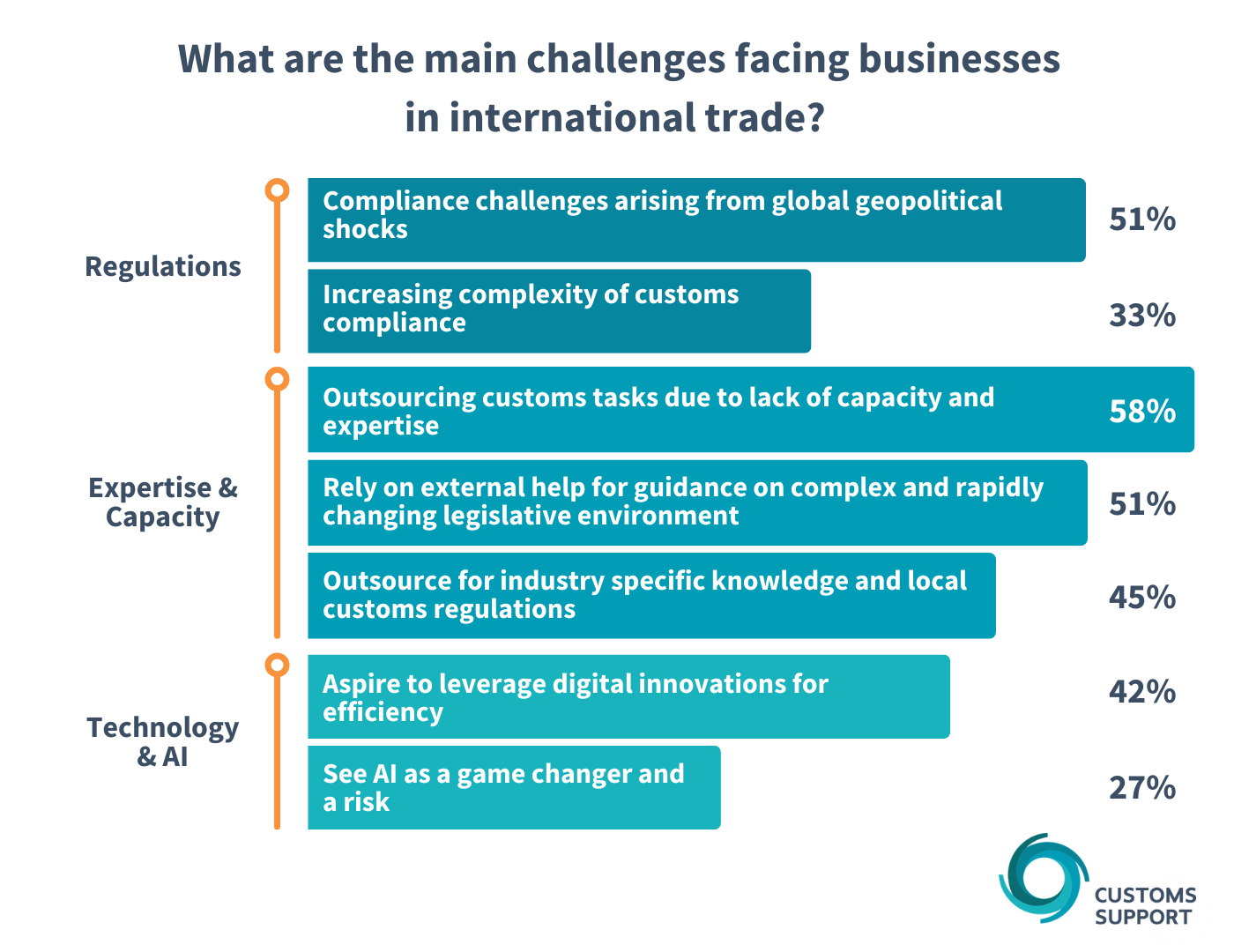A comprehensive survey of global logistics firms and goods manufacturers has revealed unprecedented geopolitical disruption, complex customs regulations, lack of internal expertise and capacity and the impact of AI as the main challenges they face in their daily trading environment.
The survey, commissioned by leading European customs and trade solutions provider Customs Support Group (CSG), revealed key trends and challenges for international trade.
The Strategic Radar customer survey presents key insights from a broad range of CSG’s clients, representing logistics service providers (LSP) and goods owners (GO), encompassing global freight forwarding companies and multinational manufacturers within the automotive, retail, consumer goods and FMCG industries.
Main challenges facing business in international trade
Three themes were consistently outlined in their responses – the challenge of complying with the ever-increasing complexity of customs regulations, a shortage of internal expertise and talent to address these issues and the opportunities and threats posed by AI.
John Wegman, CEO of Customs Support Group, said: “We have identified three consistent trends in international trade – the increasing complexity of regulations and associated risks, further intensified by recent geopolitical disruptions; the expertise and knowledge gaps companies face in addressing these issues and the high expectations for AI, coupled with concerns about potential errors.”

The survey found more than half (51 per cent) were affected by global shocks such as the Suez Canal blockage and the Ukraine war, while nearly half (45 per cent) needed specialised expertise to ensure prompt response and compliance with local and international customs regulations and dealing with stricter environmental regulations.
Diving deeper into customs compliance, the research reveals that while large international companies often keep developing in-house capabilities to maintain self-reliance, they are increasingly turning to external customs experts due to a lack of the specialised knowledge needed to address complex challenges and mitigate financial and operational risks.
Another reason for outsourcing is the ability to access more advanced digital solutions which enhance efficiency and data accuracy, coupled with the limited capacity to manage large volumes of documentation and support repetitive tasks.
Almost 60 per cent of respondents choose to outsource customs tasks to help with a lack of capacity, while 45 per cent rely on outsourcing to access specialised knowledge. Industry-specific knowledge was important to 48 per cent of respondents.
While customs handling has traditionally been paper-intensive, manual, and prone to errors, 42 per cent of respondents emphasised the importance of new technological solutions, with many recognising AI as a key opportunity to enhance automation and efficiency.
However, the complexity of regulations and documentation has led to uncertainty about how to implement these technologies effectively, as there are concerns about potential non-compliance issues arising from automated, non-human interventions.

“Ultimately, all three trends can be distilled to a common concern: the fear of non-compliance risks. Such concerns underscore the vital role of customs knowledge and expertise—what we call Real Intelligence— as the key to enhancing AI or navigating the complex and evolving regulatory landscape amidst geopolitical disruptions,” added John Wegman.
“This context explains the growing trend of outsourcing customs handling operations to professionals. As Europe’s leading and largest customs solutions provider, with more than 1,700 industry experts, we are proud to offer our clients peace of mind, ensuring their goods move across borders efficiently and risk-free.”
Empowering Global Trade
If you are interested to learn more how Customs Support Group can empower your global trade, get in touch with us via our contact form.
Customs Support Group (CSG) is the leading European customs and trade solutions provider, facilitating seamless cross-border operations through cutting-edge digital innovations and unmatched industry expertise.
With a presence in all major European strategic locations across 14 markets and the most comprehensive service offering available, CSG helps companies engaged in international trade enhance operational efficiency, optimize duties and costs, and maintain regulatory compliance amidst the ever-changing customs landscape. Supported by a team of over 1,700 dedicated customs professionals, it facilitates the smooth crossing of goods across borders with minimal risk, hassle, or delay.
Contact: press@customssupport.com














